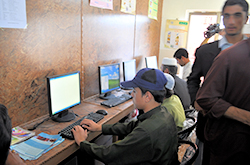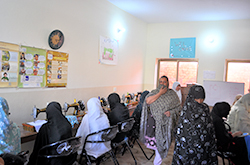16th October, 2012----UN-Habitat Pakistan and UNHCR have successfully constructed a Vocational Training Centre in Quetta under the One UN “Refugee Affected and Hosting Area” (RAHA) project in Pakistan.

The ‘Vocational Training Centre’ is a part of the RAHA project, aimed at contributing to the restoration of livelihoods of vulnerable Afghan Refugees as well as local deprived communities through the provision of a constructed building, facilities and an environment conducive to better learning. The project will directly benefit more than 1,300 students and indirectly benefit community members living in the areas of the Eastern by-pass of Quetta District.
Afghan refugees have lived without livelihood support and adequate housing and housing services in Pakistan for more than 3 decades. Second and third generation Afghans and mainly young refugees have grown up in Pakistan. About 60% of Afghans living in Pakistan reside in urban areas. A majority of this population is concentrated in Baluchistan and Khyber Pukhtunkhwa and mainly live in Quetta and Peshawar.
UN-Habitat in partnership with UNHCR started a phased demonstration project in Quetta, Peshawar, Mansehra and Karachi in September 2011 with the aim of improving hosts and refugee living conditions and creating conditions conducive to their voluntary return or migration to third countries such as skill development, health improvements etc. The project primarily aimed at improving cooperation and understanding between the host community and the Afghan Refugees.

In the opening ceremony held in Quetta on October 12th, Mr. Abdul Saboor, Commissioner Afghan Refugees, Baluchistan said, “This institute has been a great achievement and we are proud of this initiative. This will benefit not only the students but also the entire community who will be given an opportunity to develop skills resulting in a better livelihood for them. This training centre will develop the skills of both men and women for a sustainable livelihood on return to their homeland.”
The Vocational Training Centre will mobilize communities and develop their capacities; improve access to social services; develop skills, empower women and create income generation opportunities. It will strengthen the capacity of host local and Afghan refugee communities.
Siamak Moghaddam, Country Programme Manager, UN-Habitat addressed the current situation of the Afghan refugees and acknowledged the efforts of all the stakeholders involved in this initiative. He hoped that this development programme would harmoniously bring together both communities.
- UN-Habitat and UNHCR inaugurate Pak-Afghan Vocational Training Centre in Quetta, Baluchistan
- Provincial Government of Khyber Pakhtunkhwa and UN-Habitat inaugurates GIS labs for computerization and digitization process of land records.
- Beneficiary Story 1 from KPK Province, Pakistan (PDF 1.1MB)
- Beneficiary Story 2 from KPK Province, Pakistan (PDF 752KB)
- Beneficiary Story 3 from KPK Province, Pakistan (PDF 3.1MB)




















